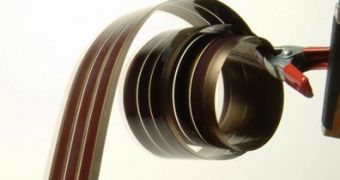Not much to say about solar cells and solar panels these days. Researchers are still working on enhancing the light-electric energy conversion rates, struggling to lower fabrication costs, making solar cells flexible... What am I talking about?? These guys are freaking geniuses! I mean they've made solar cells with the help of an inkjet printer, for God's sake!
The unique performance is attributed to a Massachusetts company by the name of Konarka, founded in 2001, at the University of Massachusetts Lowell and funded by a series of Silicon Valley companies. In a press statement released on Tuesday, Konarka writes that it has been successful in creating the first solar cell, through a fabrication method that involved the use of an inkjet printer. Simple as that, why to fabricate a solar panel when you can print it?
Konarka Technologies Inc. president and CEO Rick Hess, demonstrated the thin photovoltaic technology created by his company, thus marking a milestone in the evolution of Konarka and a fabulous breakthrough in the fabrication of flexible solar cells, and printable solar cells in particular.
Inkjet printing techniques had been previously used in the fabrication of flexible electronic circuits, as they have the extraordinary ability of placing deposits of materials in certain locations of the substrate. The shift towards the use of the method of the fabrication of solar cells was only natural, while considering that solar cells are also electronic circuits.
The use of the printing process drastically reduces the problems related to solar cell fabrication, and complex silicon based circuits in general. For example, even today, inside silicon chip preparation rooms there is the need for absolute cleanliness. Further still, multiple substrates can now be created with multiple different materials, such as plastics or differently colored materials.
The Massachusetts based company is receiving regular funding from different areas of industry, especially for the innovations in the plastics technology. Even as we speak, Konarka benefits of a budget of about 105 million US dollars from a multitude of companies, such as Menlo Park of 3i.

 14 DAY TRIAL //
14 DAY TRIAL //